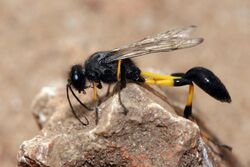Biology:Sceliphron
| Sceliphron | |
|---|---|

| |
| Sceliphron spirifex in Tanzania | |
| Scientific classification | |
| Domain: | Eukaryota |
| Kingdom: | Animalia |
| Phylum: | Arthropoda |
| Class: | Insecta |
| Order: | Hymenoptera |
| Family: | Sphecidae |
| Subfamily: | Sceliphrinae |
| Tribe: | Sceliphrini |
| Genus: | Sceliphron Klug 1801 |
| Diversity | |
|
About 30 species | |
Sceliphron, also known as black mud daubers or black mud-dauber wasps, is a genus of Hymenoptera of the Sphecidae family of wasps. They are solitary mud daubers and build nests made of mud. Nests are frequently constructed in shaded niches, often just inside of windows or vent openings, and it may take a female only a day to construct a cell requiring dozens of trips carrying mud. Females will add new cells one by one to the nest after each cell is provisioned. They provision these nests with spiders, such as crab spiders, orb-weaver spiders and jumping spiders in particular, as food for the developing larvae. Each mud cell contains one egg and is provided with several prey items. Females of some species lay a modest average of 15 eggs over their whole lifespan.[1] Various parasites attack these nests, including several species of cuckoo wasps, primarily by sneaking into the nest while the resident mud dauber is out foraging.
As is the case with many insect genera, there are many tropical species. Some common temperate species include S. caementarium and S. curvatum.
Like other solitary wasps, Sceliphron species are not aggressive unless threatened. They are sometimes regarded as beneficial due to their control of spider populations, though the spiders themselves may be beneficial in controlling pest insects. Species such as Sceliphron curvatum are invasive in some parts of Europe, where they have been observed to rapidly increase their range in recent years.
Sceliphron species
There are 34 valid species of Sceliphron.[2]
- Sceliphron arabs (Lepeletier de Saint Fargeau, 1845)
- Sceliphron argentifrons (Cresson, 1916)
- Sceliphron asiaticum (Linnaeus, 1758); Neotropics
- Type locality In Indiis was interpreted as India; syn. S. figulum
- Sceliphron assimile (Dahlbom, 1843) – Clayman's mud dauber; Texas, Mexico and Caribbean island
- Sceliphron aterrimum (Marquet, 1875)
- Sceliphron caementarium (Drury, 1773) (Sphex) – black and yellow mud dauber, yellow-legged mud dauber, black-waisted mud dauber
- North America, established in Europe and Pacific islands by the 1970s
- Sceliphron coromandelicum (Lepeletier, 1845)
- Sceliphron curvatum (Smith, 1870) – Asian mud dauber; Asia, Europe since 1970s
- Sceliphron deforme (F. Smith, 1856); Asia, reported from Europe in 2004
- Sceliphron destillatorium (Illiger, 1807); southern Palaearctic
- Sceliphron fasciatum (Lepeletier de Saint Fargeau, 1845)
- Sceliphron fervens (F. Smith, 1858)
- Sceliphron fistularium (Dahlbom, 1843); Neotropics
- Sceliphron formosum (F. Smith, 1856); Australia
- Sceliphron fossuliferum (Gribodo, 1895)
- Sceliphron funestum Kohl, 1918
- Sceliphron fuscum Klug, 1801
- Sceliphron intrudens (F. Smith, 1858)
- Sceliphron isaaci Jha and Farooqi, 1995
- Sceliphron jamaicense Fabricius, 1775; Mexico, Caribbean islands
- Sceliphron javanum Lepeletier, 1845
- Sceliphron laetum (F. Smith, 1856); Australia
- Sceliphron madraspatanum (Fabricius, 1781); Mediterranean
- Sceliphron murarium (F. Smith, 1863)
- Sceliphron neobilineatum Jha and Farooqi, 1995
- Sceliphron paraintrudens Jha and Farooqi, 1995
- Sceliphron pietschmanni Kohl, 1918
- Sceliphron quartinae (Gribodo 1884)
- Sceliphron rectum Kohl, 1918
- Sceliphron rufopictum (F. Smith, 1856)
- Sceliphron seistaniensis Jha and Farooqi, 1995
- Sceliphron shestakovi Gussakovskij, 1928
- Sceliphron spirifex (Linnaeus, 1758); Africa, southern Europe
- Sceliphron unifasciatum (F. Smith, 1860)
See also
- Chalybion
- Organ pipe mud dauber (Trypoxylon politum)
References
- Observations on the biology of Sceliphron spirifex (Linnaeus, 1758) in Romagna, Pezzi G.
- Ćetković, Aleksandar; Ivica Radović; Ljiljana Ðorović (2004). "Further evidence of the Asian mud-daubing wasps in Europe (Hymenoptera: Sphecidae)". Entomological Science 7 (3): 225–229. doi:10.1111/j.1479-8298.2004.00067.x.
External links
| Wikisource has the text of a 1905 New International Encyclopedia article about Sceliphron. |
- Short discussion on genus Sceliphron.
- Discussion on an Australian species, Sceliphron formosum
- Discussion on an American species, Sceliphron caementarium
- Online guide to eastern North American Sphecidae Documents how to differentiate Sceliphron caementarium from other Sphecids
Wikidata ☰ Q139681 entry
 |

